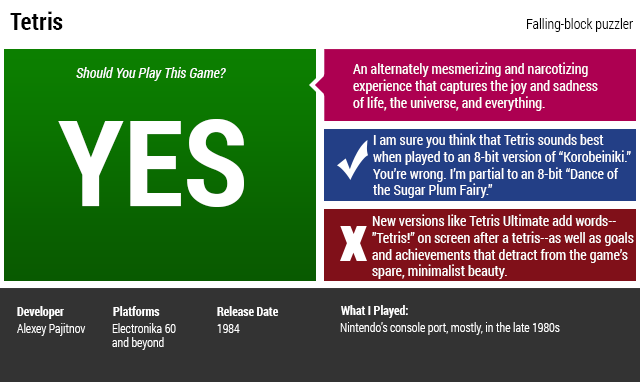Like the delightful and oppressive mobile-game galaxy that it summoned, Tetris is both seductive and dispiriting. Alexey Pajitnov’s falling-block puzzler captures the pleasure and the vacuousness of virtual labour. Each game of Tetris contains an interactive “Ozymandias”, a fruitless quest to build something that will outlast the lone and level sands. Look on my tetrominoes, and despair.
The best-known and best-loved video game — 100 million copies played on mobile devices, dozens of millions on Game Boys, another eight million on Nintendo Entertainment Systems, still more on personal computers — is not a Skinner box of rewards for players but a bleak encounter with futility. Like Space Invaders and Missile Command, or endless runners like Canabalt and Temple Run, Tetris ends with certain death. It is a jigsaw puzzle that must be assembled on deadline, yet never can be.
Tetris does not bother to offer its players the mercies of explosions or of dead aliens or of graceful, leaping arcs. Just blocks and more blocks, an unforgiving rain as predictable as the mounting seconds of the petty pace that creeps to our last syllables.
The sharply cornered right angles of the game’s shapes, and the Russian folk music in the game’s typical score, contribute to the atmosphere of cold, mechanical inhumanity (at least to American ears). In the New York Times Magazine a few years ago, Sam Anderson wrote:
Tetris was invented exactly when and where you would expect — in a Soviet computer lab in 1984 — and its game play reflects this origin. The enemy in Tetris is not some identifiable villain (Donkey Kong, Mike Tyson, Carmen Sandiego) but a faceless, ceaseless, reasonless force that threatens constantly to overwhelm you, a churning production of blocks against which your only defence is a repetitive, meaningless sorting. It is bureaucracy in pure form, busywork with no aim or end, impossible to avoid or escape. And the game’s final insult is that it annihilates free will. Despite its obvious futility, somehow we can’t make ourselves stop rotating blocks. Tetris, like all the stupid games it spawned, forces us to choose to punish ourselves.
All of that is true about Tetris, but if it were all that is true about Tetris, we would not find the game so captivating. Tetris might be the purest distillation of what a video game is. Devoid of story, character, navigation, even metaphor, Tetris isolates an interaction among player, machine, and screen and commands our attention with it. Nothing about what is best about Tetris translates to another medium.

Children, especially, are drawn to Tetris because it provides them a measure of control over a chaotic, strange, overwhelming universe. The fact that Tetris always ends means that it is always beginning. It is a game of green shoots, of empty canvasses, of newborn infants, of hope. Janet Murray, writing in Hamlet on the Holodeck, saw Tetris as a way for the player and Pajitnov to reach out to each other and create meaning out of emptiness. “Tetris allows us to symbolically express agency over our lives,” she wrote. “It is a kind of rain dance for the postmodern psyche, meant to allow us to enact control over things outside our power.”
Tetris gives us a respite from our existences, and a reminder that there isn’t one, as we hurtle toward the heat death of the universe. That it wordlessly contains both is what makes it a perfect game, a manifestation of our desperate, impossible need to steal a moment of happiness when — in grocery lines, in waiting rooms, in the back seats of minivans — life attempts to steal it from us.
Chris Suellentrop is the critic at large for Kotaku and a host of the podcast Shall We Play a Game? Contact him by writing chris@chrissuellentrop.com or find him on Twitter at @suellentrop.
GIF: Sam Woolley

Comments
7 responses to “Tetris: The Kotaku Review”
I give this game 5 broken gameboy cartridges out of 5.
It’s easy to master
Not when I was 8 years old.
The futility of it all. I never realized…
Well, this explains the existential crisis I went through when I was 7.
Tetris is easy.
I still play Tetris DX on my GB color on a daily basis 🙂
I remember having lots of fun with TetriNET back in university. It was much more fun than vanilla two-player Tetris.